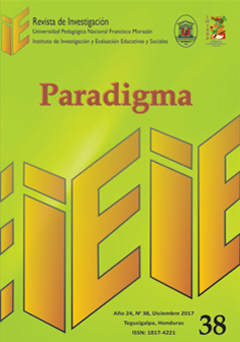Non-Formal Environmental Education oriented in the Pedagogy of Hope
DOI:
https://doi.org/10.5377/paradigma.v24i38.6773Keywords:
self-criticism, pessimism, natural resources, Millennium Development GoalsAbstract
In the middle of 2017, near the end of the second decade of the twenty-first century, humanity is struggling with the terror of a planet beset by climate change, extinction of species and loss of forests. These instances generate controversy, fear and consequently discouragement in the world population. There have been considerable inclusions of environmental issues in Honduran education raising people’s awareness. This time, emphasis will be placed on the application of hope in non-Formal education in relation to boost a self-critical thought that allows the citizen to integrate itself in a changing world where he is part and must become as such an active voice of the change he wants in his home, community and planet.
The work of the educator becomes crucial to create these spaces of self-reflection in the process of sowing hope to begin a change. The text suggests using the United Nations Millennium Development Goals as they touch upon elements of prosperity and well-being intrinsic to all of humanity.
Downloads
779
Downloads
Published
How to Cite
Issue
Section
License
Transfer of Copyright
- The author, when sending the work, states that it is his will to give the Universidad Pedagógica Nacional Francisco Morazán the patrimonial rights that correspond to him as the author of his work.
- The rights here assigned include all economic rights (Reproduction, transformation, public communication and distribution) and are given without limitation in terms of territory; This Assignment is given for the entire duration term established in the current legislation in Honduras.
- The cession of the aforementioned rights does not imply the cession of moral rights over it, because in accordance with the provisions of the Copyright and Related Rights Law, Chapter II, of the Moral Rights, Article 34, Article 25 , these rights are inalienable, imprescriptible, indefeasible and inalienable.
- The research work or document must be original and have been done without violating or usurping rights of third parties, therefore, the work is exclusively authored and owns the same.
- In the case of any claim or action by a third party, as to copyright on the work in question, the author must assume full responsibility for the rights assigned.
- Upon completion of the Rights Assignment Form, the author states that the work has not been published in another way, that the rights on the work have not been assigned and that no encumbrance or limitation on their use or use is imposed on them.





